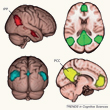Tuesday, 6 January 2015
Literary Activity and the Default Mode Network

In every human culture, much of life revolves around the stories that we tell—about the world around us, about other people, and about ourselves. When you come right down to it, just like traditional oral storytelling, that is all that modern literature and film do today. There must be something in the brain that resonates especially strongly with the narrative process.
That something might well resemble what neuroscientists call the the brain’s default mode network: the particular set of brain structures whose activity increases by default, when someone is doing absolutely nothing. (more…)
From Thought to Language | Comments Closed
Monday, 20 October 2014
Reading Novels Increases Connectivity of Areas in the Brain

Immersing yourself in reading a good novel is an excellent way to take a break from the stresses of daily life. By seeing things from the protagonists’ point of view while you are reading those few hundred pages, not only do you feel as if you have access to another world, but you may also continue to have this feeling for some time, or even for your entire life, if the book has really made an impression on you.
The neurobiological bases of this phenomenon would appear to have been discovered in a study that Gregory S. Berns and his colleagues published in the journal Brain Connectivity in Fall 2013. The subjects in this study were 21 young adults. In the first phase of the study, the subjects received resting-state functional magnetic resonance imaging (fMRI) scans for five consecutive days. The researchers then used these scans to develop a general diagram of the connectivity of each subject’s brain. (more…)
Memory and the Brain | Comments Closed







